I love to read. I find it helpful to summarize my thoughts on each book and I offer those thoughts in the hope that you will be encouraged to either read or pass over the given title.
Lord willing, tomorrow night at IDC we will finish our spring sermon series on the book of 1 John. Here are some brief thoughts on the 1 John commentaries I finished this week.
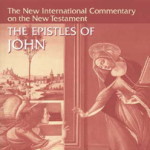 Epistles of John (NICNT) by I. Howard Marshall. If you’re familiar with the NICNT series you know it tends to be a bit more technical in nature, but Howard Marshall’s work on 1 John is full of pastoral warmth. That’s probably because the epistle on which he comments is full of pastoral sensibility and exhortation. Marshall strikes the appropriate balance in the apostle’s teaching between truth and grace/ word and spirit. Highly recommended.
Epistles of John (NICNT) by I. Howard Marshall. If you’re familiar with the NICNT series you know it tends to be a bit more technical in nature, but Howard Marshall’s work on 1 John is full of pastoral warmth. That’s probably because the epistle on which he comments is full of pastoral sensibility and exhortation. Marshall strikes the appropriate balance in the apostle’s teaching between truth and grace/ word and spirit. Highly recommended.
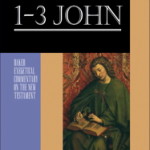 1-3 John (BECNT) by Robert W. Yarbrough. Every sermon series I’ve ever preached found me purchasing—unknowingly—at least one commentary that was, quite frankly, turgid. For me, Yarbrough’s was that one for 1 John. The simplest of truths get untold paragraphs of focus and so it’s no surprise to find yourself drowingin the detailed analysis of John’s more difficult sections. Now, I’m not against detailed attention in biblical commentary. Yet, Yarbrough’s volume in the BECNT—a series I love—is an example of losing the forest for the trees. Preacher, don’t do the same in your exposition of 1 John.
1-3 John (BECNT) by Robert W. Yarbrough. Every sermon series I’ve ever preached found me purchasing—unknowingly—at least one commentary that was, quite frankly, turgid. For me, Yarbrough’s was that one for 1 John. The simplest of truths get untold paragraphs of focus and so it’s no surprise to find yourself drowingin the detailed analysis of John’s more difficult sections. Now, I’m not against detailed attention in biblical commentary. Yet, Yarbrough’s volume in the BECNT—a series I love—is an example of losing the forest for the trees. Preacher, don’t do the same in your exposition of 1 John.
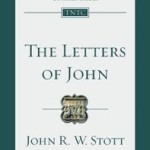 The Letters of John (TNTC) by John Stott. To read a John Stott commentary is a dangerous endeavor for preachers. If you don’t have your own outline of the passage before reading Stott’s commentary, chances are you’ll always be taking his–he’s just that good. This brisk volume in the Tyndale series has the two hallmarks of Stott on full display: precision and concision. If you are thus a preacher who tends to be wordy in your explanation, Stott will be a valuable addition to your study.
The Letters of John (TNTC) by John Stott. To read a John Stott commentary is a dangerous endeavor for preachers. If you don’t have your own outline of the passage before reading Stott’s commentary, chances are you’ll always be taking his–he’s just that good. This brisk volume in the Tyndale series has the two hallmarks of Stott on full display: precision and concision. If you are thus a preacher who tends to be wordy in your explanation, Stott will be a valuable addition to your study.
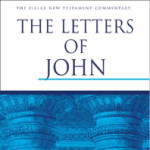 The Letters of John (PNC) by Colin Kruse. I always knew it would happen. At some point I was bound to find a volume in the Pillar New Testament series and offer a summary sigh of, “Meh.” I didn’t find the pastoral care in Kruse I so love in many of the other Pillar volumes. Also, the flow of his commentary is too frequently stilted by an “excursus” I think would have been better left woven into the verse-by-verse exposition. I’m sure some will disagree and find the theological rabbit trails useful. Looking back through its pages, this book has few underlined sentences after a first read. Somewhat disappointing.
The Letters of John (PNC) by Colin Kruse. I always knew it would happen. At some point I was bound to find a volume in the Pillar New Testament series and offer a summary sigh of, “Meh.” I didn’t find the pastoral care in Kruse I so love in many of the other Pillar volumes. Also, the flow of his commentary is too frequently stilted by an “excursus” I think would have been better left woven into the verse-by-verse exposition. I’m sure some will disagree and find the theological rabbit trails useful. Looking back through its pages, this book has few underlined sentences after a first read. Somewhat disappointing.
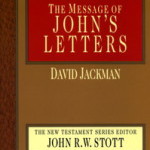 The Message of John’s Letters: Living in the Love of God (BST) by David Jackman. You can always expect a BST volume to have devotional tenderness and Jackman didn’t disappoint in his commentary on 1 John. Although I did find his commentary somewhat losing steam by the end and thought some of his expositional divisions were odd, his word is worth the money for a preacher. I regularly found Jackman providing an unusual depth of illumination into the text with winsome turns of phrase and thought-provoking outlines. Good work!
The Message of John’s Letters: Living in the Love of God (BST) by David Jackman. You can always expect a BST volume to have devotional tenderness and Jackman didn’t disappoint in his commentary on 1 John. Although I did find his commentary somewhat losing steam by the end and thought some of his expositional divisions were odd, his word is worth the money for a preacher. I regularly found Jackman providing an unusual depth of illumination into the text with winsome turns of phrase and thought-provoking outlines. Good work!
 The Epistles of John (Boice Expositional Commentary) by James Montgomery Boice. I love the ministry of James Montgomery Boice and have long thought him to be a model of a pastor-theologian. Unfortunately, his expositional volume reminded me of Yarbrough’s a bit as Boice frequently divides the text into such minute sections he misses John’s larger argument. However, Boice must be commended here for characteristic clarity in instruction and moments—albeit more sporadic than you’d expect—of homiletical brilliance.
The Epistles of John (Boice Expositional Commentary) by James Montgomery Boice. I love the ministry of James Montgomery Boice and have long thought him to be a model of a pastor-theologian. Unfortunately, his expositional volume reminded me of Yarbrough’s a bit as Boice frequently divides the text into such minute sections he misses John’s larger argument. However, Boice must be commended here for characteristic clarity in instruction and moments—albeit more sporadic than you’d expect—of homiletical brilliance.
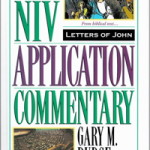 Letters of John (NIVAC) by Gary Burge. I’m sure every preacher has affinity for a particular format in the commentaries he reads (I mean, does anyone like the format of the “Word Biblical Commentary?”). I’ve long found the NIVAC’s formatting to be a bit frustrating as it moves from ancient text, to bridging context, and finally to contemporary application. I was thus somewhat astonished to find Burge’s volume on 1John the most homiletically helpful of the whole bunch I read! He offers numerous exegetical insights, yet doesn’t complicate the simplicity of John. Burge also manages to squeeze out inordinate amounts of heart-searching application from each passage. I generally judge the commentaries I use for exposition by the “Preaching Factor”; i.e., “Does this book fan into flame a desire to preach the text at hand?” The best commentaries are sermonic fire-builders and Burge’s volume ignited a flame each week.
Letters of John (NIVAC) by Gary Burge. I’m sure every preacher has affinity for a particular format in the commentaries he reads (I mean, does anyone like the format of the “Word Biblical Commentary?”). I’ve long found the NIVAC’s formatting to be a bit frustrating as it moves from ancient text, to bridging context, and finally to contemporary application. I was thus somewhat astonished to find Burge’s volume on 1John the most homiletically helpful of the whole bunch I read! He offers numerous exegetical insights, yet doesn’t complicate the simplicity of John. Burge also manages to squeeze out inordinate amounts of heart-searching application from each passage. I generally judge the commentaries I use for exposition by the “Preaching Factor”; i.e., “Does this book fan into flame a desire to preach the text at hand?” The best commentaries are sermonic fire-builders and Burge’s volume ignited a flame each week.
Click here to find other entries in the Recent Reads series.
